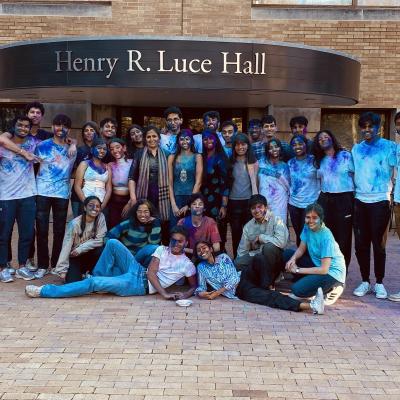Elementary Hindi
HNDI 1100 (Fall) // HNDI 1200 (Spring)
An in-depth introduction to modern Hindi, including the Devanagari script. A combination of graded texts, written assignments, audiovisual material, and computer-based exercises provides cultural insights and increases proficiency in understanding, speaking, reading, and writing Hindi. Emphasis on spontaneous self-expression in the language.
Intermediate Hindi
HNDI 1300 (Fall) // HNDI 1400 (Spring)
A two-term sequence designed to develop proficiency in the four language skills. Extensive use of cultural documents including feature films, radio broadcasts, and literary and nonliterary texts to increase proficiency in understanding, speaking, reading, and writing Hindi. Focus on cultural nuances and Hindi literary traditions and emphasis on spontaneous self-expression in the language.
Accelerated Hindi
HNDI 1320 (Fall) // HNDI 1420 (Spring)
A fast-paced course designed for students who are able to understand basic conversational Hindi but who have minimal or no literacy skills. Includes introduction to the Devanagari script; development of listening and speaking skills; vocabulary enrichment; attention to sociocultural rules that affect language use. Students learn to read simple texts and to converse on a variety of everyday personal and social topics.
Advanced Hindi
HNDI 1500
An advanced language course aimed at enabling students to engage in fluent discourse in Hindi and to achieve a comprehensive knowledge of formal grammar. Introduction to a variety of styles and levels of discourse and usage. Emphasis on the written language, with readings on general topics from newspapers, books, and magazines. The course is designed so that it can be taken multiple times, with content varying each time. HNDI 1500 is intended as a continuation of HNDI 1400; students who have not taken HNDI 1400 should speak to the instructor before registering.
Internal Migration and Hindi in Diaspora
HNDI 1560
Instructor: Swapna Sharma
India has one of the world’s most diverse and complex migration histories–both internal and international. Thus, ethnic Indians, since as early as the 17th century have established communities on every continent as well as on islands in the Caribbean and the pacific and Indian ocean thereby creating a large population of the Indian diaspora. At the same time, internal migration has also been an important and pervasive feature of the Indian economy and society. What have been the key motivating factors for internal and international migration? In what ways are the migration patterns and trends of each similar to and differ from one another? Drawing upon articles, stories, poetry, TV shows, and films on the literary cultural production of the intra-national migration as well as the global Indian diaspora with attention to theme of identity, language and legacies, students learn the dynamics associated with both internal and international migration and how internal migrants and communities of Indian diaspora experience their place of origins and place of destinations.
Prerequisite: HNDI 1500 or instructor permission.
India's Historical Journey: From the Maurya Empire to the Mughal Era
HNDI 1580
Instructor: Swapna Sharma
This advanced Hindi course is designed for students with native or near-native proficiency aiming to deepen their understanding of India’s historical and cultural evolution. The course examines key historical periods in North India, starting from the Maurya and Gupta dynasties (circa 600 BCE) through the rise and fall of the Mughal Empire (mid-18th century CE). Students explore significant political, social, cultural, and linguistic changes, with a focus on the Delhi Sultanate and Mughal Empire. Special attention is given to the contributions of female rulers and regional resistance movements, highlighting figures such as Empress Razia Sultan, Nur Jahan, Princess Jahanara Begum, Rani Durgawati, and Rani Ahilyabai Holkar. The course integrates advanced language instruction with historical analysis, allowing students to refine their Hindi skills while gaining a nuanced understanding of India's past. Through weekly reflections, midterm presentations, and a final project, students critically assess how historical events and figures are portrayed in historical and literary contexts, exploring themes of regional power, gender, and politics.
Prerequisite: HNDI 1500 or instructor permission.
Modern Hindi Literature
HNDI 1600
Instructor: Swapna Sharma
An advanced language course designed to develop overall language skills and to enrich cultural insight through the literature of different genres. Literature is the cultural canvas of a society. Reading modern Hindi literature and translations of vernacular literature from various states in India enhance the understanding of Indian culture and society.
Prerequisite: HNDI 1500 or instructor permission.
Bhakti and Bollywood
HNDI 3700
Instructor: Swapna Sharma
The goal of this advanced language course is to develop students’ overall language skills and cultural sensibility, and to provide additional knowledge of Early Hindi (Braj and Awadhi) language and literature, particularly medieval Bhakti (devotion) poetry of North India, through selected readings mostly written in Braj and Awadhi. Students begin with exploring “What is Bhakti” and “What is Bhakti and the Bhakti movement?” This is followed by the stories and biographies (hagiographies) of key poets followed by selected reading of the poetry of Surdas, Mira, Raskhan, Tulasidas and Kabir etc. that have been written in honor of Krishna, Ram and formless god of Nirgun Bhakti and has enjoyed great respect and influence on Indian cultural, art, music and society. The course explores the connection between Bhakti and Bollywood. Bhakti and Bhakti poets have influenced Bollywood in various ways. This connection is seen through Bollywood movies that portray the life and times of saint-poets and adopt their poetry directly. Sometimes this poetry is used on an occasion as a performance which has no direct connection with the main theme of the film, sometimes the same old content of poetry is echoed in modern Hindi songs, while some usages are very distant from their original form and context.
Prerequisite: HNDI 1500 or instructor permission.
Advanced Tutorial
HNDI 1980
For students with advanced Hindi language skills who wish to engage in concentrated reading and research on material not otherwise offered by the department. Work must be supervised by an adviser and must terminate in a term paper or the equivalent. Permission to enroll requires submission of a detailed project proposal and its approval by the language studies coordinator.
